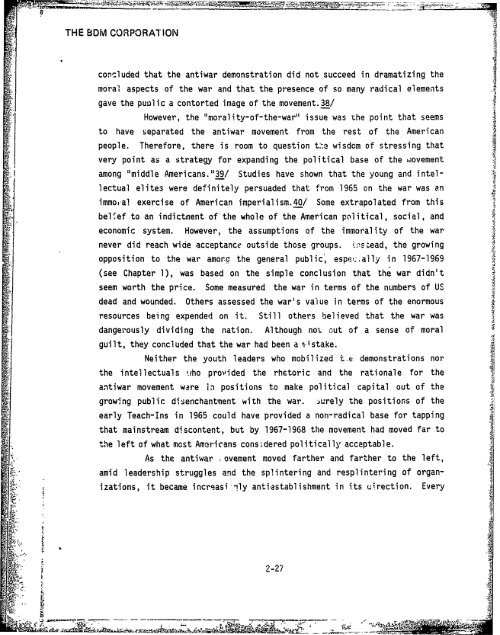policy - The Black Vault
policy - The Black Vault
policy - The Black Vault
You also want an ePaper? Increase the reach of your titles
YUMPU automatically turns print PDFs into web optimized ePapers that Google loves.
THE BDM CORPORATION<br />
concluded that the antiwar demonstration did not succeed in dramatizing the<br />
moral aspects of the war and that the presence of so many radical elements<br />
gave the puolic a contorted image of the movement.38/<br />
However, the "morality-of-the-war" issue was the point that seems<br />
to have separated the antiwar movement from the rest of the American<br />
people. <strong>The</strong>refore, there is room to question t.:e wisdom of stressing that<br />
very point as a strategy for expanding the political base of the ,oovement<br />
among "middle Americans."39/<br />
Studies have shown that the young and intellectual<br />
elites were definitely persuaded that from 1965 on the war was an<br />
immoral exercise of American imperialism.40/ Some extrapolated from this<br />
belief to an indictment of the whole of the American political, social, and<br />
economic system. However, the assumptions of the immorality of the war<br />
never did reach wide acceptance outside those groups. j:stead, the growing<br />
opposition to the war amorgc the general public, espe(..ally in 1967-1969<br />
(see Chapter 1), was based on the simple conclusion that the war didn't<br />
seem worth the price. Some measured the war in terms of the numbers of US<br />
dead and wounded. Others assessed the war's value in terms of the enormous<br />
resources being expended on it. Still others believed that the war was<br />
dangerously dividing the nation. Although not out of a sense of moral<br />
guilt, they concluded that the war had been a q.0stake.<br />
Neither the youth leaders who<br />
mobilized t.e demonstrations nor<br />
the intellectuals tiho provided the rhetoric and the rationale for the<br />
antiwar movement ware in positions to make political capital out of the<br />
growing public disenchantment with the war. jurely the positions of the<br />
early Teach-Ins in 1965 could have provided a non-radical base for tapping<br />
that mainstream discontent, but by 1967-1968 the movement had moved far to<br />
the left of what most Amoricans cons -dered politically acceptable.<br />
As<br />
the antiwar i ovement moved farther and farther to the left,<br />
amid leadership struggles and the splintering and resplintering of organizations,<br />
it became increasiily antiestablishment in its uirection.<br />
Every<br />
2-27<br />
= 7 J4 - -C'M
















